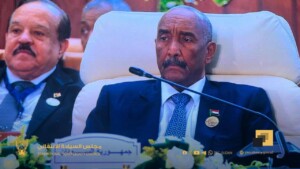Sudan’s opposition for systematic change, as ruling party announces transition policies
The chairman of the National Umma Party (NUP), El Sadig El Mahdi, has called on President Omar Al Bashir to “step down from power so as to establish a new order that will achieve a just and comprehensive peace and democratisation without violence”.
 El Sadig El Mahdi (Sudan Vision Daily)
El Sadig El Mahdi (Sudan Vision Daily)
The chairman of the National Umma Party (NUP), El Sadig El Mahdi, has called on President Omar Al Bashir to “step down from power so as to establish a new order that will achieve a just and comprehensive peace and democratisation without violence”.
Following the news last week that Al Bashir would step down as party leader of the NCP, forces signatory to the Declaration of Freedom and Change confirmed their unwavering commitment to the unconditional step-down of Al Bashir and his regime, the dismantling of repressive institutions, and the handover of power to a transitional civilian national government.
On Saturday, in a speech to an NUP leadership meeting in Khartoum, El Mahdi called on Al Bashir to take measures to ensure a safe way out of crises gripping the country, including lifting the state of emergency, stopping acts of oppression, torture, killing, beating, and halting security forces’ attacks on peaceful civilians, as well as the release of all detainees.
He urged President Al Bashir to show readiness to meet the representatives of popular, professional, and civic forces who are demanding transitional change from the current regime and objected to what he called militarisation of the administration.
Transition policies
The acting head of the ruling National Congress Party (NCP), Ahmed Haroun, meanwhile announced that the NCP will witness “new transition policies” during the next phase of governance. No further detail of these policies was given in the statement.
Haroun, who is the NCP’s Deputy Chairman for Political and Organisational Affairs, will carry out the tasks of acting chairman until convocation of a general conference of the NCP, to “provide an opportunity for the party to determine its options and to pick a new candidate for the presidency.”
On Saturday, NCP Political Secretary, Omar Basan, explained that the party faces a number of challenges, most notably unifying its members after the departure of President Al Bashir, conducting a dialogue with parties to prepare for the elections, and restoring confidence in the political process.
He confirmed that there are a number of leaders of his party qualified to succeed President Al Bashir.
Internal differences
Think tank International Crisis Group (ICG) suggested that Al Bashir may have been pushed to step down as party leader due to internal factions in the party: “Leaders [of the Islamist wing] are said to advocate a more positive response to demonstrators’ demands. If the split deepens, it could raise the spectre of a dangerous confrontation between these well-organised and well-armed camps,” the ICG said.
Following the president’s resignation form the party, it has been reported that the NCP is also preparing to renew contact with opposition forces in the country. “In order to end political tension in the country, the party intends to conduct an open dialogue with the leaders of the opposition in all its spectrums and alliances,” reliable sources told Sudan Tribune, on condition of anonymity as they are not authorised to speak to the press.
Al Bashir made half-hearted attempts to begin a dialogue with opposition forces in his speech at the Presidential Palace on February 22, stressing that the National Dialogue document will be the basis for dialogue with all political forces. This attempt was dubbed “out of touch” by particular opposition forces.











 and then
and then